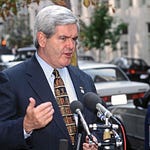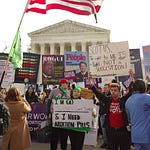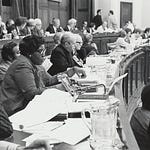It looks like the Dominion trial has been delayed for a day, but your craving for more information about the political right in the United States can be satisfied here. And if you know someone else who would be interested, please:

In the late 1950s, the John Birch Society may have been on the fringe of the Republican Party. Still, it was not an insignificant force in American politics. Gathering the remnants of Senator Joe McCarthy's supporters, white supremacists, libertarians, and former America Firsters under one umbrella, the John Birch Society was playing an active role in American politics only four years after it was founded.
By 1962, Birchers were running for office as Republicans, and some were winning. More often, like other ultra-right organizations that would evolve from the John Birch Society, during campaign seasons, these zealots provided an army of willing labor for far-right Republicans trying to topple the eastern, elite establishment that the Birch-affiliated activist Phyllis Schlafly dubbed "the king makers" in her 1964 self-published book, A Choice, Not An Echo.
Who were the kingmakers? They were the business and political establishment within the GOP, Schlafly charged, who foisted candidates on the people. These soft conservatives, who would later be derided as "squishes," were comfortable with the status quo. Like Democrats, they were soft on communism, spent taxpayer dollars on foreign entanglements, believed in big government, and left Americans vulnerable to crime, immigrants, and the whims of international financial interests.
And in 1964, the Birchers got their presidential candidate: Senator Barry Goldwater of Arizona. Although Goldwater was not a member of the John Birch Society, he certainly sounded like one in his acceptance speech.
Goldwater lost, but the effort to elect him had strengthened ultra-conservatives in the GOP, and they continued to organize.
As a result, Birchers' ideas took hold in the Republican Party in the following decades, and they began to build new conservative institutions. Bircherism became part of the populist Republican insurgency that elected Ronald Reagan in 1980, promoted the presidential candidacy of Patrick J. Buchanan in 1992, strengthened the 2008 presidential bid of libertarian Ron Paul, produced the Tea Party, and elected the Tea Party's Congressional arm, the Republican Freedom Caucus.
Listeners may remember that the Freedom Caucus bent the Republican Party to its will during the contested election of House Speaker Kevin McCarthy in January 2023. And we all know that since the 2016 election, Welch's radical ideas have become mainstream among conservatives: isolationism, returning to the gold standard, a government plot to weaken the American people and make them vulnerable to international financial elites, slashing the federal government, using the military against civilians, states' rights, and xenophobia.
Program notes:
You can listen to more of John Birch Society founder Robert Welch Jr.’s speech here; Barry Goldwater’s acceptance speech for the 1964 Republican nomination is here.
You can purchase one of the original copies of Phyllis Schlafly’s A Choice, Not An Echo (Pére Marquette Press, 1964) online and own a little bit of history.
The Donald Trump clip is from the former president’s 2024 campaign kickoff in Waco, Texas, on March 25, 2023.
Here is a wonderful biography of Welch by Edward Miller.
Dallek describes the censure of Joe McCarthy in 1954. Here is the record of that moment from the United States Senate; here is a transcript of the proceedings from the National Archives.
Robert Taft was a conservative Republican Senator who worked to rebuild the GOP after the Great Depression and New Deal. You can read a biography of Taft here.
John Birch Society conspiracy theories are legendary in their weirdness, but as Claire and Matt discuss, many have survived in quite similar forms today. You can read more about this in D.J. Mulloy, The World of the John Birch Society: Conspiracy, Conservatism, and the Cold War (Vanderbilt University Press, 2014.)
Who was John Birch? T learn more, you can read Terry Lautz, John Birch: A Life (Oxford University Press, 2016.)
As Matt mentions, Robert Welch also wrote a biography of John Birch.
Matt talks about the complexity and contradictions of the relationship between iconic conservative William F. Buckley and the John Birch Society. You can read more about that here.
Matthew also references one of his own articles in Politico.
You can read more about Richard Nixon’s struggles with the John Birch Society here; a more recent article in The New Yorker elaborates on the Society’s lasting influence.
Matt also discusses the Birchers’ focus on law and order campaigns. Go here for a conversation between Jarrod Shanahan and Tyler Wall about the connections between these older campaigns and today’s Blue Lives Matter movement.
For more information about Lawrence ‘Larry’ McDonald, you can read his biography and this article on Politico.
Claire mentions the fact that the John Birch Society exists today: check out how the organization represents itself on its website.
You can download this podcast here or subscribe for free on Apple iTunes, Spotify, Google Podcasts, or Soundcloud.













Share this post